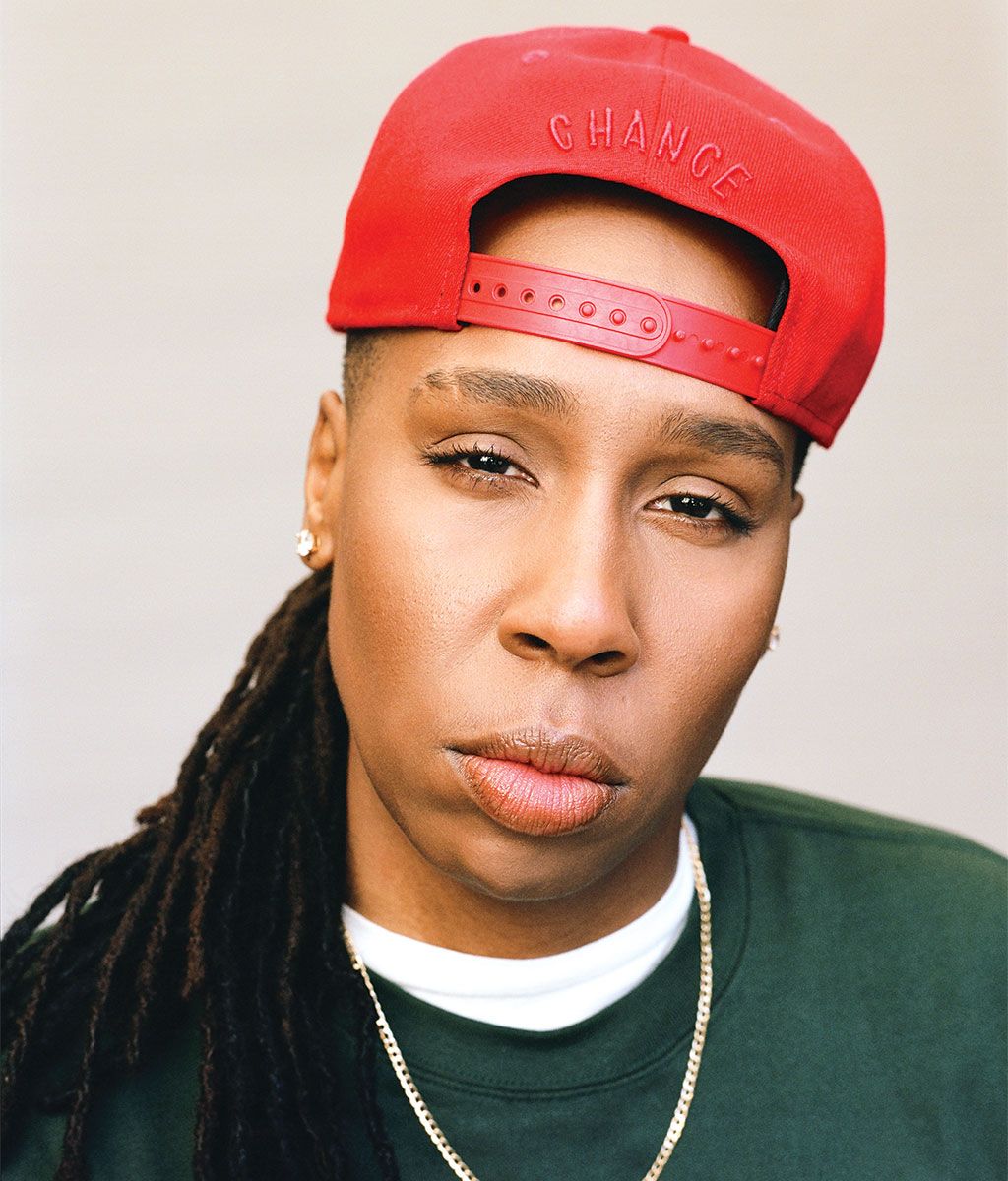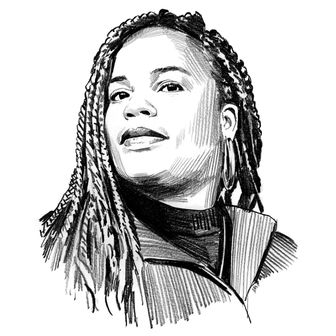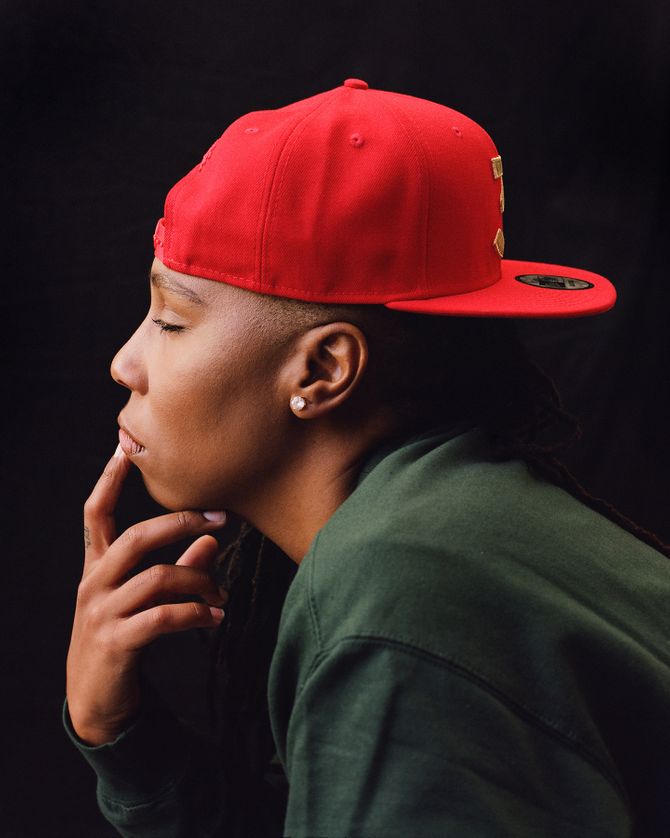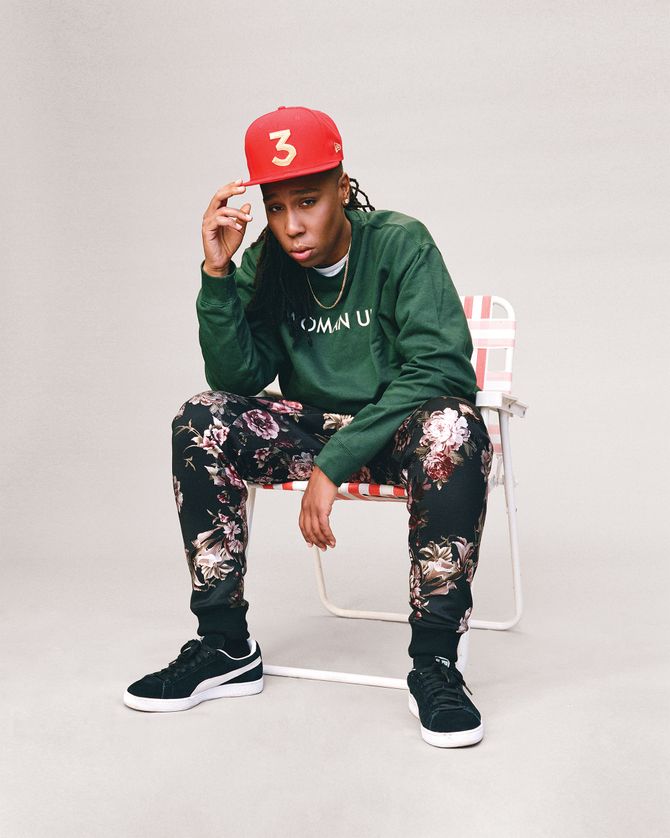Silver Lake’s LAMILL coffee shop is crowded for a late afternoon, just a few days after Christmas. The sleek black tables are dotted with white cups and plates and laptops open to Final Draft or some other screenwriting program. The gaudy, metallic-teal leather chairs are full of attractive people who look like they’ve answered a casting call: Extras needed for café scene, male or female, age: late-20s/mid-30s. Any ethnicity (but predominantly white). Talent should look hip; tattoos preferred.
It’s the perfect scene for actress and writer Lena Waithe to walk into, wearing a vintage Tales From the Hood T-shirt, tapered heather-red Nike sweats, and sneakerhead-approved Nikes. And not just because she’s a screenwriter in fashion joggers in a coffee shop during working hours, or because this could easily be a Los Angeles–based episode of Master of None, the Netflix show she appears on as Denise, a black lesbian sneakerhead who dispenses love advice to Aziz Ansari’s hapless Dev. It’s because, after writing an Emmy-winning episode for the show’s second season, Waithe is the person you’d want to imagine the inner lives of every mustachioed barista and blunt-bobbed vintage-store owner currently in the shop. She’d take these stock characters and imbue them with nuance and life and humor. She’d probably get a series order and maybe even pick up another Emmy.
After she grabs a lavender lemonade, Waithe joins me at a table and looks over the room for a moment.
“Okay, how many stories could you write about the people in this room?” I ask.
“Oh, a million,” she says. “I’ve always been more interested in exploring the lives of these people that I see on the street. You know what I mean?”
All right, write me a show, I suggest, hoping she’ll come up with some story about a delicate-nosed woman who has her auburn hair in giant rollers, wrapped up in a silk scarf.
Waithe waves off the request. Right now, she tells me, her mind is full of her own characters. Actually, she explains quickly — Waithe is a fast talker, and talking to me means she’s taking a break from her writing day, she says while glancing at her watch for emphasis — she’s working on a script she hopes to get made by 2019, which apparently means not wasting a minute in 2017. And anyway, the story of the Silver Lake white-hipster set is not the story she is interested in telling.
“At the end of the day, it’s like, I care about my people. Like, that’s what I care about. I have a vested interest in the black men, black women, poor community — I care about us and trying my best to show who we are, through my lens. How can I paint an accurate picture of what black life is? I know my people and I want to write for them. I want to write to them.”
The facet of black life Waithe has chosen to focus on for The Chi, the series she’s created for Showtime, takes her back to where she’s from, the South Side of Chicago. Still, the neighborhood featured in the show isn’t reflective of the community she remembers. “I grew up in a peaceful neighborhood,” she says of the predominately black “utopia” where she was raised by her single mother, Laverne Hall, along with a close-knit group of her mother’s friends and a steady diet of TV shows like A Different World, The Mary Tyler Moore Show, and Martin. “It wasn’t perfect,” Waithe says of the neighborhood, but it wasn’t the South Side depicted in The Chi.
Instead, the idea for the sprawling and slow drama came from headlines Waithe would see about the rampant gun violence on the South Side. The year she wrote the pilot, 2015, there were 468 murders and 2,900 shootings in Chicago, mostly concentrated in neighborhoods on the south and west sides of the city.
The Chi focuses largely on four male protagonists connected by the fallout from two shootings. There’s Brandon (Straight Outta Compton’s Jason Mitchell), a hopeful chef who is using his talent to escape the neighborhood but feels responsible for his mom and younger brother, Coogie (Jahking Guillory); Emmett (Jacob Lattimore), a sneaker-obsessed teen with an unplanned child; Ronnie (Ntare Guma Mbaho Mwine), who is trying to avenge his son’s death; and preteen Kevin (Moonlight’s Alex R. Hibbert), who navigates junior-high crushes, theater rehearsals, and bearing witness to a murder.
The structure and subject matter — how violence and gangs threaten everyday life — have earned the show comparisons to The Wire and the lukewarm Shots Fired, which Waithe expects but disagrees with. She cites David Simon’s earlier work, The Corner, as an inspiration, as well as Downton Abbey and James Baldwin. “I’m not writing about the cops. I’m not writing about the system. I don’t care at all about trying to write about the system. But I can write about how the cops make me feel.”
Fans might be surprised that the show isn’t autobiographical — though certain elements are all Waithe. One character is named for her mother; another, Ronnie, for an uncle of Waithe’s who recently passed. The character of Emmett is based on a friend from high school. It was nonnegotiable for Waithe, a lesbian, to include at least one black queer female character. And Waithe does see herself in one character. “I’m Brandon, 100 percent. I made him a chef because it’d be too meta to make him a writer,” she says. (Brandon’s girlfriend, Jerrika, is modeled on Waithe’s fiancée, Alana Mayo.) Waithe notes that the sensitive black chef struggling with family responsibilities was the character TV executives had the hardest time understanding.
It was only two years ago that Waithe started shopping around the script for The Chi, but it was a totally different climate. “This was before Issa [Rae], this was before Barry [Jenkins] and before Moonlight won the Oscar, before Jordan Peele.” And, it bears noting, even before the appearance of Master of None and Waithe’s character, Denise. In fact, Denise was originally supposed to be white and straight, a possible love interest for Dev.
In meetings with television executives about The Chi, they kept asking her, “ ‘What’s the hook?’ ” Waithe recalls. “ ‘Are they selling drugs? Are they singing? Are they … Are they … Are they athletes?’ That’s what everyone was comfortable with, certain categories: drug dealer, kingpin, singer, dancer, music industry. They kept asking, ‘Oh, is he gonna win? Is he gonna make the basketball team? Is he gonna get the record deal?’ It’s so cheesy. And I was like, ‘It’s about being black and human in a city that’s very complex. That’s it.’ I write black people in rooms talking.”
In the past year, Waithe admits, things have changed. There is more opportunity, for her and for others, to write black people in rooms talking. Barry Jenkins has now written Moonlight, Issa Rae has now written and starred in Insecure, Donald Glover won an Emmy for Atlanta, the show he created. There’s Greenleaf and Queen Sugar. Ava DuVernay (who once gave Waithe a job, as a production assistant) has directed A Wrinkle in Time and Ryan Coogler has directed Black Panther, two potential blockbuster films. Television and film are much blacker than ever before.
“Look, this will be controversial,” she says, her hand emphatically hitting the table with every word that follows, “but the truth is, we create culture. We create the fucking culture, we do. But I think ultimately black people are making content that not just black people want to watch but everybody wants to watch. Now white execs are like, ‘Okay, well, we gotta find our Issa Rae. We gotta find our Donald Glover. We gotta find our Lena Waithe.’ ” She sits back and sips her lemonade.
At 33, Waithe became the first black woman to win an Emmy for outstanding writing in a comedy series. The episode she wrote for the second season of Master of None, “Thanksgiving,” is ambitious and highly personal, but simple. It’s her own story of how she came out to her family. “Aziz asked me to tell him stories about my life, and he liked this one and asked me to write an episode.” At first she declined. She felt overcommitted with The Chi and was in London filming the upcoming Steven Spielberg film Ready Player One. But Ansari insisted. “He said, ‘I can write my stuff, but everything you explained, like, I can’t write that. Only you can.’ ” She conceded and Ansari flew to London; the two of them hunkered down in a hotel room and wrote the episode in three days.
“I didn’t expect that to happen so early in my career,” Waithe says of the Emmy win. “But for me, it was like, I’m just going to tell my story. It kinda felt like [Michael] Jordan at Game Six, almost. Like, all my life I had been preparing for that moment.”
In interviews after she won, Waithe stressed that, yes, opportunities on television were getting better, but no, the work isn’t done. In a speech at a party for United Talent Agency earlier in December, Waithe said, “Make sure that you’re making your own shows, because I still don’t think the television landscape represents this society.”
For the first season of The Chi, her writers’ room is made up entirely of black writers, she notes proudly — a team of writers she is now mentoring to help them cultivate their own projects. “It was me and four black writers.” She ticks off the lists of names and accomplishments. “Our showrunner was really committed to having all black writers.”
I ask Waithe if it was complicated to have a white male showrunner, Elwood Reid, helming a show written by a black woman and a team of black writers, when it’s hyperspecific about black life and black people and black culture.
She winces. “I mean, I think … Is it complicated? You know, I mean, maybe, but the truth is, again, it’s like, that is because there weren’t … there were not a lot of other options,” she says cautiously. And then, more emphatically, “I think the showrunner is just that. They, like, make sure the trains run on time. Creatively there’s no influence. For me, it was really about tapping into those black writers and making sure their voices were heard. And that was everyone’s mission, just to make sure the show didn’t feel like it was a black show written by somebody that don’t know the culture.”
Waithe glances at her watch again, needing to wrap it up. She has a movie to write — a romance that will potentially be directed by Melina Matsoukas (who directed “Thanksgiving,” episodes of Insecure, and Beyoncé’s “Formation” video). Then Waithe has to make her comedy Twenties, a lighter half-hour loosely based on her life as a 20-something in L.A. Hopefully, there will be season two of The Chi to think about, too. “I want to make it blacker,” she says, picking up her keys to go. “That’s the mission. I just want to make Hollywood blacker.”
*This article appears in the January 8, 2018, issue of New York Magazine.



